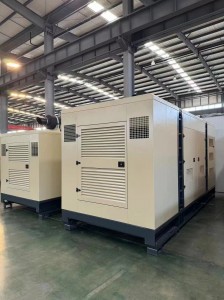Gas generator sets, as an efficient and environmentally friendly power generation method, are widely used in various fields. Its composition and structure are crucial for the performance and operational stability of the unit. This article will provide a detailed analysis of the composition and structure of gas generator units.
Composition of Gas Generator Set
The gas generator set mainly consists of the following parts:
Gas engine: Gas engine is the core part of gas generator set, responsible for converting the thermal energy of gas into mechanical energy. Gas engines usually adopt a reciprocating plug or rotor design, and choose the appropriate model according to different application scenarios.
Control system: The control system is responsible for centralized control and management of gas generator units, including start-up, operation, shutdown, and other processes. The control system also includes various sensors and actuators for monitoring and controlling the operating status of the unit.
Fuel system: The fuel system is responsible for supplying gas to the gas engine, including components such as the fuel tank, oil pump, and filter. The fuel system needs to ensure a stable supply of gas and filter out impurities to ensure the normal operation of the engine.
Cooling system: The cooling system is used to export the heat of the gas generator set and prevent the unit from overheating. The cooling system usually includes components such as radiators, water pumps, fans, etc., and adjusts the temperature according to different operating conditions.
Electrical system: The electrical system is responsible for converting and distributing the electrical energy of the gas generator set, including the generator, cables, control cabinets, and other components. The electrical system needs to meet the demand for electricity load and provide safe and reliable power supply.
Auxiliary system: The auxiliary system includes compressed air system, lubricating oil system, intake and exhaust system, etc., providing necessary conditions and support for the normal operation of the gas generator set.
Structure of Gas Generator Set
The overall structure of gas generator sets usually adopts modular design, which is convenient for transportation and installation. Its main structure includes:
Base: The base is the basic part of a gas generator set, used to support and fix the main components of the unit. The base is usually made of welded steel, which has sufficient strength and stability.
Engine module: The engine module is the core part of a gas generator set, including components such as the cylinder block, crankshaft, connecting rod, and cylinder head. The structural design of the engine module needs to ensure sufficient combustion of gas and efficient energy conversion.
Electrical module: The electrical module includes components such as the generator and control cabinet, and is the power production and control center of the gas generator set. The structural design of electrical modules must meet the needs of power supply and provide safe and reliable power output.
Cooling module: The cooling module includes components such as radiator, water pump, fan, etc., which are used to export the heat of the gas generator set. The structural design of the cooling module needs to arrange the positions of the heat sink and fan reasonably to ensure good heat dissipation effect.
Auxiliary module: The auxiliary module includes components such as compressed air system, lubricating oil system, intake and exhaust system, providing necessary conditions and support for the normal operation of the gas generator set. The structural design of the auxiliary module needs to consider the connection and coordination between various components to ensure the stability and reliability of the unit operation.
In summary, the composition and structure of gas generator units are crucial for their performance and operational stability. A reasonable structure and component configuration can fully leverage the advantages of gas generators, improve energy utilization efficiency and reliability, and reduce operating and maintenance costs. With the continuous progress of technology and the improvement of environmental protection requirements, the application prospects of gas generator sets will be even broader.
Post time: Jan-19-2024

